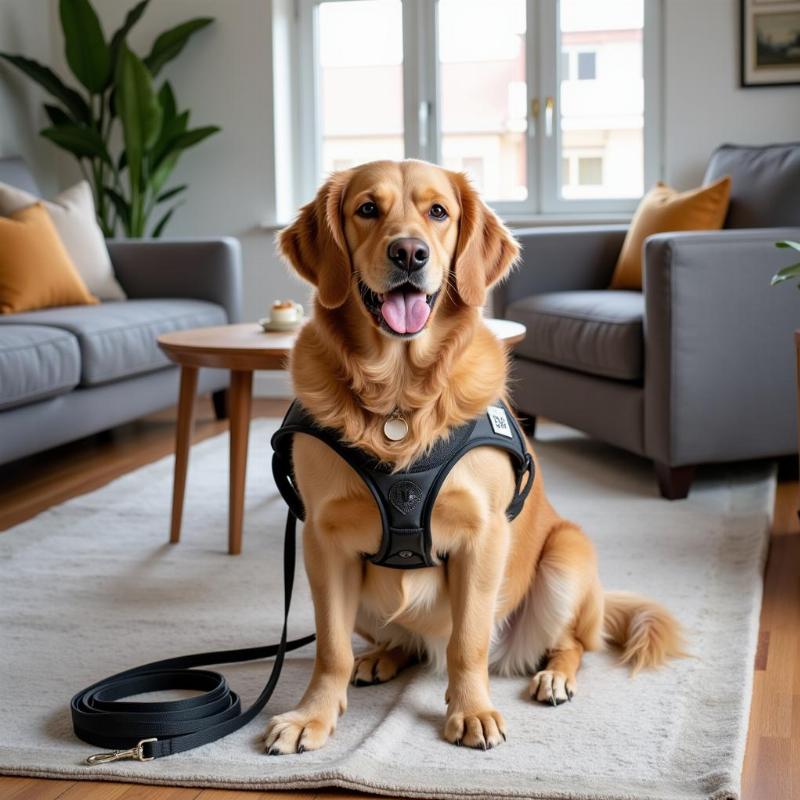Understanding the rights of service dog owners and the responsibilities of landlords regarding service animals is crucial in the US. While apartments generally have pet policies, “can apartments deny a service dog?” is a common and valid question. The short answer is: generally, no. Federal law protects the rights of individuals with disabilities to have service dogs in housing, even if the housing has a “no pets” policy. This article delves into the complexities of this issue, clarifying the legal landscape and offering practical advice for both service dog handlers and landlords.
Understanding the Fair Housing Act and Service Animals
The Fair Housing Act (FHA) is the cornerstone of protection for service dog handlers seeking housing. This federal law prohibits discrimination based on disability, including refusing to make reasonable accommodations for individuals with disabilities. A service dog is considered a reasonable accommodation under the FHA. This means that landlords must generally allow service dogs in their properties, even if they have “no pets” policies. The FHA applies to most types of housing, including apartments, condominiums, and privately owned houses offered for rent.
 Service Dog Living in an Apartment
Service Dog Living in an Apartment
Reasonable Accommodation vs. Undue Burden
While landlords are obligated to make reasonable accommodations, there’s an important caveat: undue burden. Landlords can deny a request for a service dog if it creates an undue financial or administrative burden. However, the burden of proof lies with the landlord. They must demonstrate with concrete evidence why accommodating the service dog would be unduly burdensome. Simply claiming a potential increase in insurance costs or hypothetical property damage is insufficient.
What Qualifies as a Service Dog?
Under the Americans with Disabilities Act (ADA), a service dog is defined as a dog that has been individually trained to perform specific tasks or work for a person with a disability. These tasks must directly relate to the individual’s disability. Emotional support animals (ESAs), while offering comfort and companionship, are not considered service dogs under the ADA and therefore do not have the same legal protections. This distinction is important, and landlords are generally within their rights to deny ESAs if they have a “no pets” policy.
What Information Can a Landlord Request?
Landlords can request documentation related to the individual’s disability and the dog’s training if the disability and need for the service dog aren’t readily apparent. However, they cannot inquire about the specifics of the disability or demand extensive medical records. Acceptable documentation might include a letter from a healthcare professional confirming the need for a service dog. They can also request proof that the dog is a trained service dog.
Can Apartments Charge Pet Fees for Service Dogs?
Landlords cannot charge pet fees or deposits for service dogs. This is because service dogs are not considered pets under the FHA and ADA. Charging a fee for a necessary accommodation for a disability would be considered discrimination.
What if My Service Dog Causes Damage?
While landlords cannot charge pet fees upfront, they can hold service dog handlers responsible for any damages caused by their dog, just as they would hold any tenant accountable. Normal wear and tear is not considered damage.
Quote from Dr. Emily Carter, DVM, Certified Applied Animal Behaviorist: “It’s essential for both landlords and service dog handlers to understand the legal framework surrounding service animals in housing. Open communication and mutual respect can facilitate a smooth and positive tenancy experience for everyone involved.”
Quote from John Miller, Esq., Housing Rights Advocate: “The Fair Housing Act provides strong protections for individuals with disabilities and their service dogs. Landlords must be prepared to make reasonable accommodations and understand the limitations on what information they can request.”
Conclusion
The question, “can apartments deny a service dog?” has a nuanced answer rooted in federal law. While landlords are generally prohibited from denying service dogs, understanding the distinction between service dogs and ESAs, the concept of undue burden, and the permissible requests for documentation is crucial for both landlords and service dog handlers. Open communication, respect for the law, and a willingness to work together can help ensure that individuals with disabilities have equal access to housing with their service animals.
FAQ
- What is the difference between a service dog and an emotional support animal? A service dog is specifically trained to perform tasks related to a person’s disability, while an emotional support animal provides comfort and companionship. Service dogs have more legal protections under the ADA and FHA.
- Can a landlord ask for proof that my dog is a service dog? Yes, if the disability and need for the service dog are not readily apparent.
- Can a landlord charge a pet deposit for a service dog? No.
- What if my service dog damages the apartment? You are responsible for any damages caused by your service dog, beyond normal wear and tear.
- Where can I learn more about the Fair Housing Act? You can visit the Department of Housing and Urban Development (HUD) website.
- What if my landlord denies my service dog despite my disability? Contact a housing rights organization or an attorney specializing in disability rights.
- Are service dogs in training covered by the FHA? Generally yes, though specific state laws may vary.
Beautdogs.us: Your Trusted Resource for Dog Care
Beautdogs.us is your premier destination for all things dog-related in the US. We offer expert advice on dog breeds, care, and products, empowering you to provide the best possible life for your canine companion. Whether you’re a seasoned dog owner or just starting your journey, Beautdogs.us offers a wealth of trustworthy resources. Contact us at [email protected] or +1 501-555-7529 for personalized guidance.